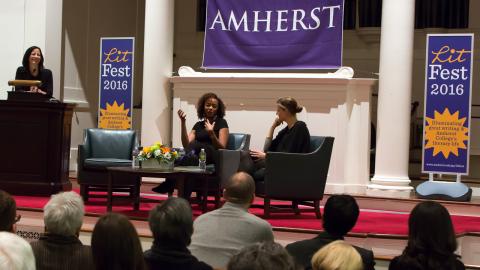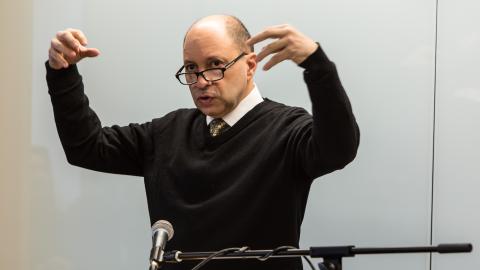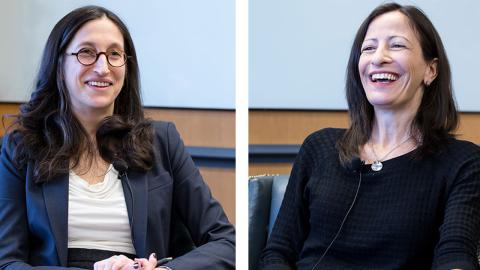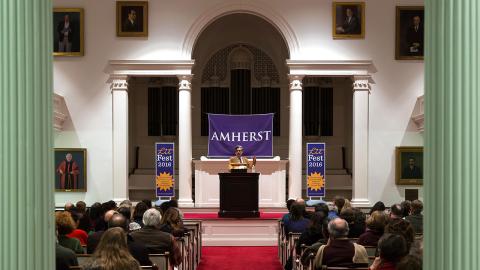A Conversation with Angela Flournoy and Lauren Groff '01

LitFest kicked off on Thursday, March 3, with the debut of the partnership between Amherst and the National Book Awards (NBA) on Campus program, which brings NBA winners and finalists to colleges and universities for readings, discussions and book-signings.
Nearly 200 students, faculty, staff and community members came to see 2015 NBA fiction finalists Angela Flournoy, nominated for The Turner House, and Lauren Groff ’01, nominated for Fates and Furies, hosted in conversation by Deborah Treisman, fiction editor of The New Yorker.
The discussion followed brief readings by Flournoy and Groff and centered on the authors’ writing processes and literary influences. It also addressed the authors’ fictional explorations of the various ways individuals are shaped and influenced by their closest relationships.
Groff, who studied English and creative writing as an undergraduate at Amherst, couldn’t resist mentioning Professor Judy Frank as one of her greatest influences. Calling Frank’s courses “life-changing” and “amazing,” Groff said, “Professor Frank was one of the first living writers I ever met,” which made her realize that she, too, could have a career as a writer.
Flournoy, a graduate of the Iowa Writer’s Workshop and the University of Southern California, passed on these words of wisdom to burgeoning writers in the audience: “An idea is not a novel. You need a character to be the engine that drives the idea forward.”
“10,000 Years of the Book Business in 45 Minutes,” with Harold Augenbraum

On Friday morning, March 4, Harold Augenbraum, executive director of the National Book Foundation, delivered a talk about the history and future of the book business.
Beginning with narrative cave paintings and traveling through time with stone and clay tablets, papyrus, the printed book and e-readers, Augenbraum challenged the audience to imagine a world without books: “Without books and without writing, we wouldn’t be where we are today,” he said. “A world without books is almost impossible to imagine.”
“America’s Fiction Unedited,” with Jennifer Acker ’00 and Deborah Treisman

Following Augenbraum’s talk was a conversation with Deborah Treisman, hosted by Jennifer Acker ’00, editor-in-chief of Amherst’s award-winning literary magazine The Common.
The discussion centered on Treisman’s work as The New Yorker’s fiction editor, a job she’s held since 2003. “Sometimes people have this idea of the editor coming in and saying [to the author], ‘You have to cut 60 pages,’ but it’s never like that,” she said. “It’s always a discussion. … That’s my favorite part of my job, that back-and-forth.”
During the Q&A, Treisman was asked how submitted stories come to her attention. “If the top of the pile is where a story belongs, it will get there,” Treisman answered. “I’ve had stories come in through friends of friends, teachers, agents, the writer directly. … It’s somewhat random, and everything does get read.”
An Evening with Michael Chabon

On Friday night, Chabon read several pages of something he said he’s never read out loud before, Fountain City: A Novel, Wrecked, during his event at Johnson Chapel.
Fountain City is a four-chapter annotated fragment of an unpublished—“wrecked”—book project that Chabon began and ultimately scrapped in 1992. Focused on writing, the writing process and failure, the reading contained an abundance of often humorous but practical advice for aspiring writers.
Chabon’s tips included “Write smaller books”; “Trust your gut and heed the icy grip of the Hand of Dread”; and “Marry a strong, talented, vocal, articulate and—above all—persuasive reader.”
Chabon’s answers in the subsequent Q&A with the audience were equally insightful. In answer to a question about whether it is wise to write about what you know, Chabon responded quickly and frankly. “No. That’s terrible advice,” he said, to laughs from the audience. “You’re not very interesting—I’m sorry. Neither am I.”
He then spoke thoughtfully about the importance of creativity, research and experience and decided he needed to qualify is initial reaction. “Write about what you know,” he said, “but know more than you do. You have to rise to the occasion of a book.”
A Conversation with Mark Bowden and Stacy Schiff, Hosted by Cullen Murphy '74

Major LitFest events wrapped up with a nod to nonfiction on Saturday morning, when Vanity Fair’s Cullen Murphy ’74, chairman of the Amherst College Board of Trustees, moderated a conversation with authors Mark Bowden and Stacy Schiff. Bowden is a national correspondent for The Atlantic and author of books including Black Hawk Down, a National Book Award finalist. Schiff is the author of, most recently, The Witches: Salem, 1692, and four other books, including a Pulitzer Prize-winning biography of Vera Nabokov.
The wide-ranging discussion covered everything from the importance of reading history, to the attention spans of young people, to the unreliability of primary sources.
When embarking on a new project, Schiff said she looks for “what isn’t on the shelf” and searches out the silences. She shared her rule of thumb in choosing a subject: “You have to like your subject, but you should never love him or her.” Being “under the spell of your subject” means writing a lesser biography, she explained.
Bowden talked about telling stories through the perspectives of multiple players and the ways those perspectives often clash. He described it as his job to understand the people he writes about. When interviewing sources, he said, “I can promise them that they and their point of view will be accurately reflected in the story I write,” but he can’t promise that they’ll like the final story.
“If you’re going to think critically and write honestly about anyone,” he added, “you’re going to offend them.”